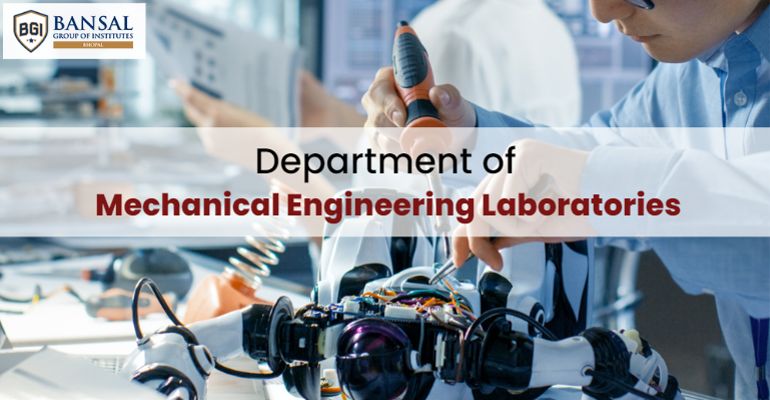Department of Mechanical Engineering Laboratories

Department of Mechanical Engineering Laboratories
Mechanical Engineering is the most fundamental area of engineering practice. It is most likely the only engineering discipline with numerous applications across all industries. Innovations made during the Industrial Revolution, such as the steam engine, internal combustion engines, turbines, compressors, refrigeration, and air conditioning systems, were the work of mechanical engineers.
Thus being aware of the basics of mechanical engineering is essential for everyone.
Here we tell you about all the important laboratories that the Mechanical Engineering Department of the Bansal college possess and what is its importance.
The Mechanical Engineering Laboratories at Bansal Group of Institutes includes,
- Basic Mechanical Engineering Lab (BME)
- Engineering Mechanics Lab
- Workshop Practice Lab
- Instrumentation & Control Lab
- Theory of Machine Lab
- Fluid Mechanics Lab
- Manufacturing Technology Lab
- AUTOCAD Lab
- Thermal Lab
- Material Technology Lab
- Strength of Material Lab
- Manufacturing Process Lab
- CAD-CAM Lab
- Internal Combustion Engine Lab (IC)
- Automobile Engineering Lab
- Mechanical Vibration Lab
- Heat and Mass Transfer Lab (HMT)
- Refrigeration and Air-Conditioning Lab (RAC)
1.Fluid Mechanics Lab –
The fluid mechanics laboratory helps you understand the fundamentals of fluid mechanics like fluid statistics, kinematics and dynamics.
This laboratory provides practical knowledge about the daily operations around things like minor and major losses in pipes, sum of energy, rate of flow in open and closed ducts, velocity in pipes, etc.
Fluid Machinery laboratory is set up for the 3rd year mechanical students to conduct the test on the fluid machinery to study the performance characteristics of basic machines like the output power, input power, efficiency, head and discharge.
2. CAD-CAM Lab –
CAD-CAM( computer-aided design and computer-aided manufacturing) is used to refer to the laboratories dedicated to specific computer softwares that are used to both design and manufacture the products.
The application of CAD software is to create concepts or industrial designs using the latest technologies. Whereas CAM uses different tool path designs to automate manufacturing processes.
3. Heat and Mass Transfer Lab (HMT)-
The heat transfer lab allows the students to learn and understand the practical application of all the three modes of heat transfer i.e conduction, convection and radiation.
Heat and Mass Transfer Lab(HMT) has its applications in various fields including automobile, steam-electric power generation, energy systems, cooling of electronic devices and in the characterisation & diagnosis of various diseases.
4. Instrumentation & Control Lab –
The word instrumentation refers to development or use of measuring instruments for observation and monitoring. The laboratory comprises various simple and complex instruments used for the purpose of measuring a physical quantity, such as flow, temperature, level, istance, angle or pressure.
While working with complex and heavy instruments in the laboratories getting accurate measurements could be one difficult process. This is why instrumentation is highly important. Accurate instrumentation is needed to ensure that every tool and device is operating properly.
5. Automobile Engineering Lab –
Automobile and engineering laboratory provides the environment to mechanical engineering students to enable them to understand the fundamental concepts of automobile engineering that includes the basic structure, body style, powerplant and wheel & tire assembly.
The major application is to study and prepare reports on the constructional details, working principles and operation of the automotive engine systems and subsystems.
6. Internal Combustion Engine Lab (IC) –
The Internal combustion engine laboratory enables students to understand the basic construction of two stroke and four stroke diesel and petrol engines. The laboratory consists of basic parts of an engine like carburetor, fuel injection system, cooling system, etc.
The objective of this laboratory is to provide an environment to the students wherein they can carry out research in the areas of internal combustion engines with an aim to increase fuel efficiency, emission control, and engine durability and the development of new technologies.








